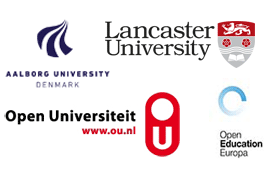

OOPS! Or, Designing an Intercultural Online Participatory Seminar in the Spirit of Highlander Folk School
Ilene D. Alexander, Alexander Fink, University of Minnesota
Seeking to build a relational, reflexive, dialogical, and praxis-oriented online learning space to engage intercultural teaching and learning, an experienced educator of future teachers and a graduate student in youth leadership developed an open seminar that embodied its content (intercultural, inclusive learning and teaching) in praxis. As teachers and activists rooted in pedagogies emerging from social justice movements, we are committed to discussion practices and learning spaces that embody citizen leadership practices of the Highlander Folk School: relational, reflexive, and praxis-oriented. We sought to do this in an online space that encouraged these types of networked learning connection between learners, teachers, and the materials we brought together. We attempt – in designing, facilitating, and assessing the course – to address three compelling, emergent questions:
• How do we design a seminar as an open, online learning space where teaching professionals explore richly diverse pedagogical histories, intercultural and inclusive learning theories, and boundary crossing practices through dialogical discussions? (Coffield and Edwards, 2009; Lather, 1991)
• How do we counter repressive tolerance – the practice of allowing all voices to be heard, even those playing on systemically harmful narratives (racism, sexism, classism, heterosexism, ableism.)? (Brookfield, 2007)
• How do we wrestle with the pervasive “problem of time” (Wallace 2000) – practitioners’ on-going hope to infuse multicultural learning and teaching practices that is often side-lined by perceptions of there not being time enough to “deal with” classroom diversity, or support enough to “get to” the work of building more intercultural learning and teaching practices?
Building the OOPS! with learning circles in mind allowed us to link to Dennen (2008), and Pentland (2014), who investigate effective discussion patterns across learning spaces. Both underscore the importance of short, overlapping, dense interactions via comments generated in response to discussion prompts. Dennen adds that in-built practices of meta-cognitive reflection further support knowledge creation and longterm learning. Pentland adds that such discussion practices are necessary within high-performing cooperative groups working to understand why or whether to validate or invalidate emergences of consensus and dissent. Drawing on Elbow, Wallace, Dennen, and Pentland, we named our discussion process as improvisation, asking students to “yes, and” in responding to course springboards and others’ words. Learners took this very seriously; most conversations took a tone of expansion and seeking understanding, even when contentious issues arose.
This paper outlines the process of designing the seminar, briefly examines how it functioned, and closes with ideas for exploration with NCL participants.
Keywords
learning spaces, participatory seminar, feminist pedagogies, social justice pedagogies, multicultural learning and teaching, universal design for learning, inclusive learning and teaching, dialogic discussion, Highlander Folk School, learning circles
Joint Organising Institutions
| Conference Travel and Accommodation |Doctoral Consortium | Past Conference Proceedings | Contact |